- Home
- Roy J. Snell
Sign of the Green Arrow Page 12
Sign of the Green Arrow Read online
Page 12
CHAPTER XII JOHNNY'S DAY OFF
Next morning Johnny and old Samatan sailed away toward the smiling faceof the rising sun.
"This is a grand dugout you've got!" Johnny enthused.
Smiling, Samatan pulled a line, giving the boat full sail. She tiltedsharply. Boy and man settled back against the pull of the sail and spedalong before the wind.
Johnny's eyes took in the whole of the trim little craft, and he smiled,contentedly.
It was indeed a great little dugout. Not so small, either. Fully twentyfeet long and six feet wide, it had been hewn from a solid mahogany log.The boy tried to estimate the number of days of hard, careful work thatwould have required, but gave it up.
The inside surface was polished to the last degree, and the seats werebraided, cocoanut fibre. On the prow, carved in the most perfect manner,was the wooden image of a seagull.
All unknown to Johnny, Samatan was keeping an eye on him. His keen oldmind read the boy's thought like a book. One lover of a sailboatrecognizes another, and since his tenth birthday, Johnny had been anardent sailboat enthusiast. At that age he had rigged up a square sailfor a rowboat and had known many happy hours on the water. The fact thathe had once capsized and barely escaped drowning, had not in the leastdampened his ardor.
"We go coral reef. Catchem turtles for stew," Samatan said at last.
"How do you catch them?" Johnny asked.
"Samatan show you."
After that there was silence.
It became evident that Samatan was an expert with a sail. The breezepicked up and the sea became choppy, but the smiling old man, eyessquinting, lay back at ease. Pulling first at one rope, then another, heheld the small craft on her course.
Johnny laughed right out loud when at last the old man took off his soft,loose shoes, gripped the ropes with his toes and began steering with hisfeet.
Two delightful hours passed. Then the dugout slid up on a sandy shore.
When the boat had been pulled up, Samatan's eyes scanned the sandy beach.Suddenly he went racing away and, with the silence and speed of a greatcat, stole up on an unsuspecting turtle, basking in the sand. A quickleap--and the turtle lay on its back, a prisoner.
"Food," said the old man. "Much food from the sea. But," he addedquietly, "we take only what we need."
When all the turtles needed had been stowed away in the boat, they wentfor a walk on the beach. They made a strange picture, this bright-facedAmerican boy and the old, brown native whose face was wrinkled by manytropical suns.
Seldom had Johnny spent a more interesting or exciting morning. They hunga heavy cord over a rocky ledge to snare a sea-crab, turned over aHawk's-bill turtle, whose shell was worth eight dollars a pound, andchased a monkey up a cocoanut tree.
They had wandered for two hours and were far from the boat when, for noapparent reason, Samatan uttered a low exclamation. Then he facedsquarely toward the ridge, which at this place rose some twenty feetabove the beach.
"Huh!" he grunted. "We see!"
He dashed away at surprising speed, up the hill. Tripping over vines andblundering into a bramble bush, Johnny followed.
When at last he caught up with the agile old man, Samatan was standingmotionless, looking off at the sea. For a full minute, lips parted, eyesstaring, they stood there in silence.
For--stealing up on them like an enemy in the night, a terrific storm wasracing in from the sea. It took but one word from Samatan's lips tocomplete the terror of the prospect.
"Hurricane!" he said, gutterally.
"We must run for the boat!" Johnny sprang down from the rock.
"Not go now. Too late!" Samatan did not move. Instead, he stood lookingalong the ridge, first this way, then that.
"The _Sea Nymph_!" Johnny broke out again. "She will be lost!"
"Not get lost," Samatan said, slowly. "Good crew. Harbor not far." Onceagain his eyes swept the ridge.
"Come," he said at last. "This way. We go fast." Even as he spoke, a gustof wind sweeping in from the sea, all but threw the boy off his rockyperch.
For ten minutes or more the two of them fought their way along the ridge.At last the native paused. "Here," he said, "is most high. Trees. Mustclimb these--quick! Waves go all over coral reef!"
"Al--all right." The rising gale blew Johnny's words down his throat.Seizing the low branches of a large tree, he prepared to climb.
"No! That bad tree! No good!" said Samatan. "This one."
Into Johnny's mind at that moment came the words of the professor: "WhenI am in a strange land I do what a native will do--go where he goes. Ifhe says 'No go'--I stay."
So, without further questioning, the boy began to climb Samatan's tree.
The tree was short and sturdy. Soon they were perched like crows on twolimbs close together. And in silence they watched the onrushing storm.The sky was black. It was like night. Scarcely could the boy see hiscompanion. Trembling with excitement, he decided to force his thoughtsfrom the impending hurricane.
"Samatan," he said, "there was something about our steel ball you did notlike."
"Yes," came the instant reply. "Professor--he is good man. Very good. Butone thing must not do. He must not!"
"He is going to tell me," Johnny thought, with quickening pulse.
But at that moment there came such a roar as would drown the strongestvoice, and onto the beach came the rush of a great sea. Something like atidal wave had struck the narrow reef.
"I must hang on," the boy thought. The next instant he was engulfed instinging salt water. The sea had swept over the land.
Though Johnny felt that he was being swallowed by the sea, it was inreality only the froth and foam of the monster wave that reached him. Oneinstant he was gasping for breath, the next, he was looking down on amadly whirling world.
The thought that struck him first, with the force of a blow, was--"thetree I meant to climb is gone! Swept away by the sea!"
It was true. The tree, rotten at the roots, had vanished. Samatan hadsaved his life, and a new sense of respect for the aged native swept overJohnny. With it came the conviction that whatever it was the old nativewanted from the professor, it must be right for him to have it. Andsomething seemed to assure Johnny that he would hear the story withoutasking.
But at that moment, to talk at all was impossible. The shrieking of thewind, the cracking of branches, the roar of thunder and the mad tumult ofthe sea, were completely deafening. Johnny wondered how long it wouldlast? Would greater waves come? Would he and Samatan at last be sweptinto the sea? To all these questions he found no answer.
In an effort to forget the terror of the situation he made himself thinkonce more of the great steel ball and his adventures beneath the sea....
In the meantime his companions on the _Sea Nymph_ were witnessing a featsuch as even the gray-haired captain never had seen equaled. Watching thestorm, yet fearing for the safety of Johnny and Samatan and hopingagainst hope that they might return, they on the yacht had delayedlifting anchor.
When at last they headed toward the narrow entrance of a natural harbor,the wind tore their sails to ribbons, while waves, mountain-high, sweptthem toward a rocky wall.
In despair, the captain trusted the fate of his ship to the native crew.Nor did he trust in vain. With a few yards of sail at their command thenatives, in the midst of dashing spray, clung to spar and masthead,turning the graceful craft this way and that. Then--at precisely theright instant--they seemed to lift her from the sea and send her shootingthrough a channel so narrow it seemed the paint would be scraped from hertwo sides at once. They sent her gliding smoothly to safety, in a harboras calm as a millpond.
"Bravo!" shouted the captain.
"Glorious!" the professor cried. "Never saw such sailing! Those mendeserve all praise!"
Six long hours the storm roared on, and for six endless hours Johnnyclung to his tree. Though the sea, like some menacing monster, appearedto thrust out long, white arms
to grasp him, he remained safely withSamatan, in the tree top. At last, sweeping high overhead, thestorm-clouds raced away--to leave a kindly, golden moon looking down onthe boy and the old man.
"Come," said Samatan, climbing gingerly down from his perch. "We goback."
"Back to what?" Johnny's lips framed the words he dared not speak.
Their trail back over the moonlit beach was strange beyond belief. Theyclimbed over a huge old palm tree, lying on the ground, stumbled on agiant, loggerhead turtle, killed in the storm, and slipped on jellyfishleft high on the ridge.
As they rounded a bend in the beach, a large object loomed before them,white and ghostly in the night.
"Boat," said Samatan.
"Lifeboat," the boy amended as they came closer.
Examining it closely he read the words: "S. S. Vulture". Bashed in at theprow, the boat lay empty, upside down. What was its story? Had theVulture been wrecked? Had part of her crew put to sea in this boat, onlyto perish?
With a shudder, Johnny pushed on behind his tireless guide.
"Our boat must be gone," he ventured at last.
Samatan made no reply.
More fallen palms, tangled sea moss, jellyfish, a dead crocodile, a mileof sand, and then--Johnny rubbed his eyes. He opened them to look again.
"Our boat!" he exclaimed.
"Yes," Samatan said.
It was true. The boat was safe. Piled with seaweed and half-buried insand, it remained where they had left it.
A brief examination redoubled the boy's admiration for the aged native.The dugout had been chained to a stout, palm stump. Even the sail waslashed beneath the seat. Samatan had taken all these precautions beforethere was any sign of a storm. Wise old Samatan!
In awed silence Johnny helped to clear the sand and seaweed away.
"Now we go," said Samatan, preparing to launch the boat.
If Johnny had admired Samatan's sailing before, his admiration wasdoubled now. Up--up--up they glided, until they seemed ready to touch thestars, then down--down, far into the trough of a wave.
"Samatan." Johnny spoke without thinking. "Why do you hate our steelball?"
"Hate? Ball?" Samatan struggled for the right word. "Good man, professor.But must not steal natives' gold!"
"Gold?" Johnny ejaculated. "I don't understand."
The tale the old man told, then, out there on the racing sea, wasfantastic indeed. Yet Johnny doubted never a word of it....
The islands now belonging to Samatan's native people once had been aFrench colony. The French had made slaves of the natives, and had broughtin many more slaves. Then the slaves revolted and drove all the Frenchmenfrom the islands.
"After that--_our_ land!" Samatan declared proudly. "Long time republic.Long time everybody happy. Then," his voice dropped, "how you sayit--came bad man. Very hard man. Very cruel. Make people work too hard.Want gold. All gold. By and by want kill that man, my people.
"This bad man see strange men come--many men." Samatan continued. "Theyput gold in chest--much gold--and dump in sea.
"Now," Samatan sighed, "bad man dead. Gold lost. Never find that gold, mypeople. Belong my people--that gold! Find gold--my people pay debts. Veryhappy. But now," he frowned, "Professor, he hunt gold with steel ball.Wanna keep that gold, you think, that professor?"
"Oh, no! No!" Johnny laughed. "The professor is not looking for treasure!Only strange fishes, all sorts of odd creatures that live beneath thesea."
"Not wanna find gold?" The old man was plainly puzzled.
"Oh, sure--I s'pose he'd _like_ to find it," Johnny laughed. "And--we'llreally try to--now that we know about it. But if we _do_ find it, you maybe sure it will all be for your people--to the last doubloon!"
"Good boy, Johnny." The old man smiled broadly. "Good man, Professor. Allgood. Everybody!"
"I see a light," said Johnny. "That must be Kennedy's place."
"Right, Kennedy." said Samatan. "By and by we come that place."
"That," said Johnny, "will be swell!" Then his brow wrinkled. Where, hewondered, was the _Sea Nymph_? Did it make harbor safely? He sighed as hereflected that soon he would know the answer--for better or worse!

 On the Yukon Trail
On the Yukon Trail Wings over England
Wings over England Johnny Longbow
Johnny Longbow Sally Scott of the WAVES
Sally Scott of the WAVES The Secret Mark
The Secret Mark Betty Leicester's Christmas
Betty Leicester's Christmas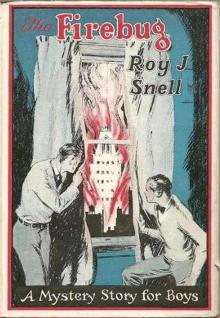 The Firebug
The Firebug Minnie Brown; or, The Gentle Girl
Minnie Brown; or, The Gentle Girl Jack the Hunchback: A Story of Adventure on the Coast of Maine
Jack the Hunchback: A Story of Adventure on the Coast of Maine The Silent Alarm
The Silent Alarm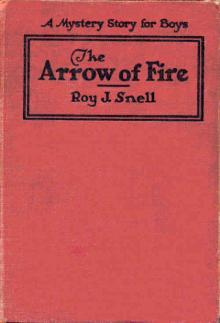 The Arrow of Fire
The Arrow of Fire The Magic Curtain
The Magic Curtain The Crystal Ball
The Crystal Ball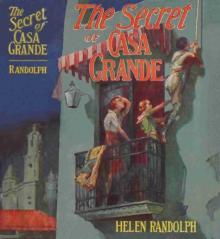 The Secret of Casa Grande
The Secret of Casa Grande Gypsy Flight
Gypsy Flight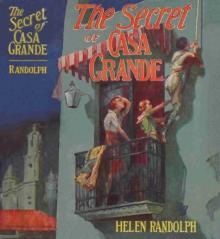 The Mystery of Carlitos
The Mystery of Carlitos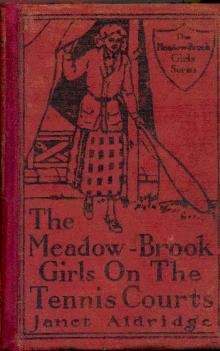 The Meadow-Brook Girls on the Tennis Courts; Or, Winning Out in the Big Tournament
The Meadow-Brook Girls on the Tennis Courts; Or, Winning Out in the Big Tournament Witches Cove
Witches Cove Riddle of the Storm
Riddle of the Storm Forbidden Cargoes
Forbidden Cargoes Green Eyes
Green Eyes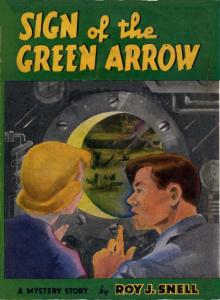 Sign of the Green Arrow
Sign of the Green Arrow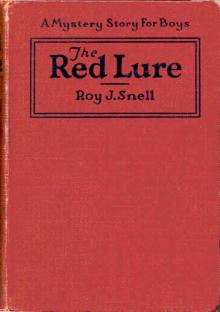 The Red Lure
The Red Lure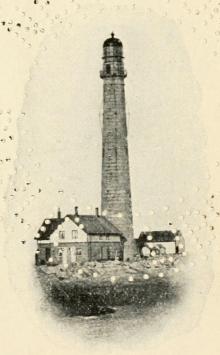 The Light Keepers: A Story of the United States Light-house Service
The Light Keepers: A Story of the United States Light-house Service A Ticket to Adventure
A Ticket to Adventure Helen in the Editor's Chair
Helen in the Editor's Chair Blue Envelope
Blue Envelope The Purple Flame
The Purple Flame Whispers at Dawn; Or, The Eye
Whispers at Dawn; Or, The Eye The Rope of Gold
The Rope of Gold Crossed Trails in Mexico
Crossed Trails in Mexico The Shadow Passes
The Shadow Passes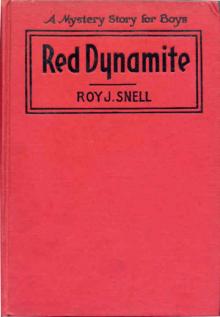 Red Dynamite
Red Dynamite Blue Grass Seminary Girls on the Water
Blue Grass Seminary Girls on the Water The Cruise of the O Moo
The Cruise of the O Moo